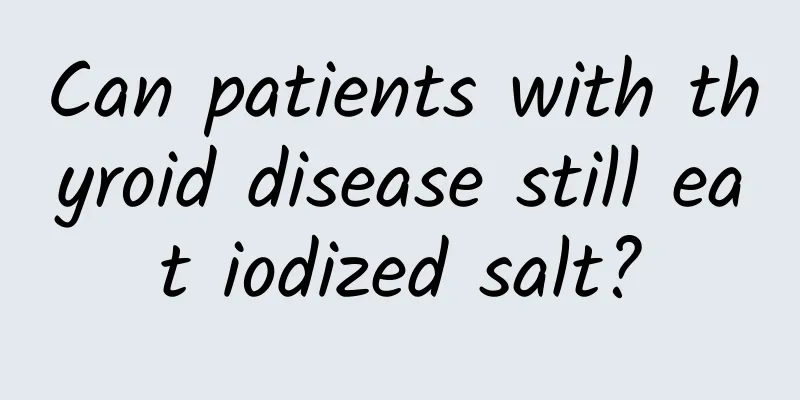Can patients with thyroid disease still eat iodized salt?

|
□ Science Times reporter Shi Qi May 15th is the 31st National Iodine Deficiency Disease Prevention and Control Day, and the theme of the event is "Iodine-added salt to prevent disease, balanced nutrition for health". There have always been many misunderstandings about iodine supplementation, such as which groups of people need iodine supplementation? Can patients with thyroid disease eat iodized salt? In response to these questions, a reporter from Science Popularization Times interviewed Fang Yi, director of the Endocrinology Department of the Fifth Medical Center of the PLA General Hospital. "Iodine is an essential micronutrient for human metabolism and growth and development, but the human body cannot produce iodine. If iodine intake is stopped, the iodine stored in the human body can only last for 2-3 months." Fang Yi introduced that insufficient iodine intake can lead to a series of diseases such as goiter, intellectual disability and iodine-induced hyperthyroidism, which are called iodine deficiency diseases. Adults with iodine deficiency may also experience fatigue, lack of concentration, and decreased work efficiency. Most areas in my country are iodine-deficient. The iodine that the general population gets from food and drinking water every day cannot meet the normal needs of the human body, so continuous additional iodine supplementation is needed. In particular, special groups such as pregnant women, nursing mothers, infants, children and adolescents should pay more attention to adequate iodine supplementation. Fang Yi said: "The ideal iodine intake for adults is about 150 micrograms per day, for pregnant and lactating women it is 200-300 micrograms, and for children it is correspondingly reduced." Among the comprehensive measures to prevent iodine deficiency, iodizing salt is the simplest, safest and most effective way. Iodide in iodized salt is easily lost in a humid, hot and acidic environment, so the public should choose iodized salt in small packages with designated logos and store it in a cool and dry place. In addition, you can also consume iodine-rich seafood, such as kelp and seaweed. Excessive or insufficient iodine intake will increase the incidence of thyroid nodules, so iodine supplementation should be appropriate. Fang Yi said: "The vast majority of thyroid disease patients can consume iodized salt normally during treatment and try to avoid insufficient or excessive iodine intake, but the specific situation depends on the situation." Fang Yi gave an example, saying that among patients with hypothyroidism, those whose thyroid glands have been completely removed or completely destroyed will not have a significant effect on their thyroid glands if they consume iodized salt; patients whose thyroid lobes have been removed or whose thyroid tissue still remains can also follow a normal iodine diet. If the patient's hypothyroidism is caused by iodine deficiency, they need to increase their iodine intake appropriately; patients with hypothyroidism caused by excessive iodine need to limit their iodine intake. Patients with hyperthyroidism should also limit their iodine intake and avoid iodine-rich foods and drugs as much as possible. |
>>: Cancer may strike quietly. Have you caught these body signals?
Recommend
Do pregnant women need to take cod liver oil?
When babies eat cod liver oil, it helps promote t...
A woman dreams of fighting with a snake
Women aged 30 to 60 sleep an average of only 6 ho...
A 1cm live worm was removed from the boy’s eye. Pet parasites must be prevented!
Audit expert: Wu Lei National licensed veterinari...
Early symptoms of female progeria
There are thousands of types of diseases, and we ...
Can uterine fibroids be treated with abortion?
Nowadays, the probability of women suffering from...
Do I need to fast for breast ultrasound?
Nowadays, the pressure of life is getting greater...
How long does it take to clean up the lochia after cesarean delivery?
Have you heard of lochia? Do you know how long it...
What are the symptoms of lobular hyperplasia?
Female breast lobular hyperplasia can have a grea...
How to treat a small amount of uterine fluid with diet
Intrauterine effusion is fluid accumulation in th...
How to practice vaginal blowing
We all know that when men and women have sexual r...
What tests should I do when I'm pregnant?
Some people do not know what tests to do during t...
What to do if a woman has sexual frigidity and vaginal dryness
If a woman has no passion and is sexually cold du...
How long does it take for the lochia to be clear after induced labor and curettage?
Induced labor is performed when it is a last reso...
Bleeding 4 days after ectopic pregnancy surgery
Ectopic pregnancy can cause great harm to the hum...
There is a hard lump on the cesarean section incision, what should I do?
Many pregnant mothers compare the process of caes...









